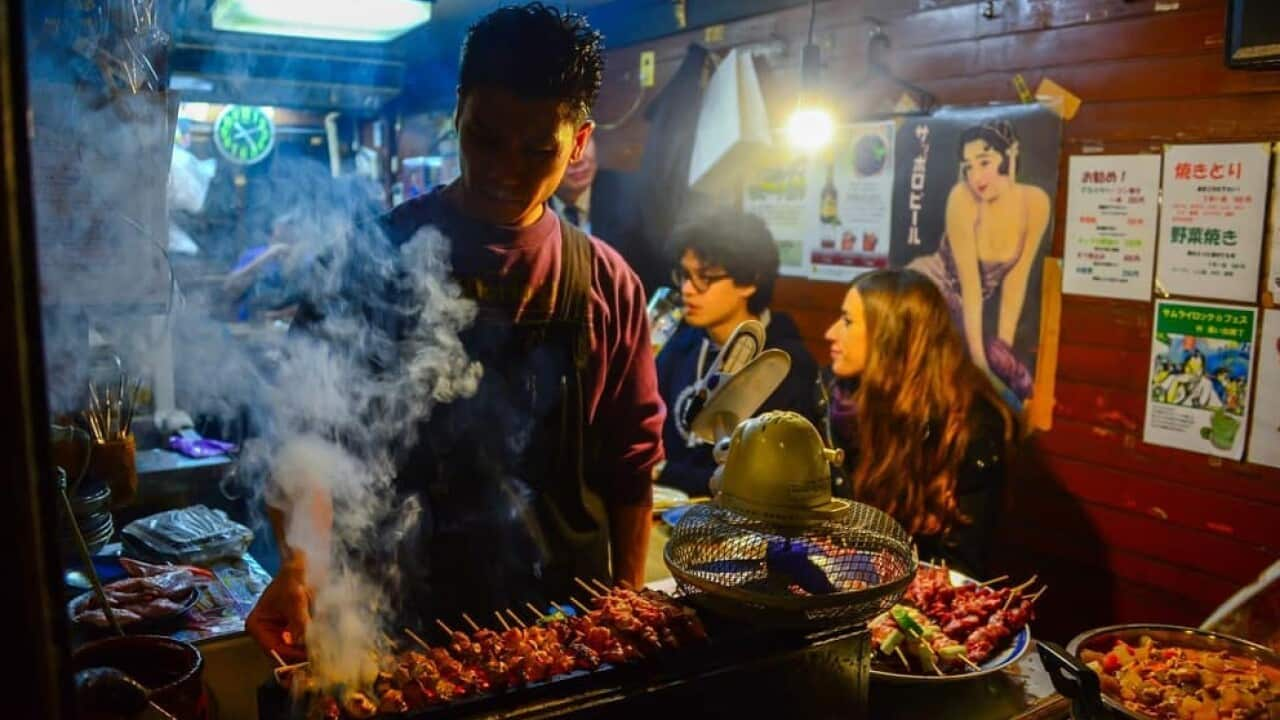Alem’s House, a vegetarian Ethiopian cafe-restaurant on Parramatta Road in inner-city Sydney, is sandwiched between two gyms. Naturally, a lot of muscly men poke their heads in, seeking a post-workout feed.
“There are guys who want to come in for bacon and eggs for breakfast or their steak sandwiches. They like the look of the place, and when they realise it's vegetarian …” says co-owner Nethanet Assefa, trailing off. If only they knew that injera, the fermented, gluten-free flatbread that’s a staple in Ethiopian cuisine, is an ideal post-gym recovery food. It’s made with teff, a wholegrain flour that’s .
If only they knew that injera, the fermented, gluten-free flatbread that’s a staple in Ethiopian cuisine, is an ideal post-gym recovery food. It’s made with teff, a wholegrain flour that’s .

Nethanet Assefa and Nicholas Gilmore are the husband-and-wife team running Alem's House in Camperdown. Source: Yvonne C Lam
“It’s like a savoury pancake. A lot of Ethiopian long-distance runners swear by it,” says Assefa.
At lunch and dinner, the injera functions like an edible plate, upon which an assortment of wat – stews, curries, salads, and sautees – are served. Traditionally, diners eat with their right hand, tearing off a piece of fluffy injera to scoop their desired wat, and transferring it to their mouth.
Typically, Ethiopian dishes feature chicken, lamb, goat and seafood, but Assefa says there’s a strong vegan culture in the country, thanks to its majority Orthodox religion. (Ethiopia has the outside of Europe.)
“There's forty days of fasting prior to Easter, which is basically a vegan diet. It's quite a rich diet – there's a lot of options that [don't have] animal products,” she says.
At Alem’s House, diners mix and match from the selection of seven wat. One injera-scoop could include some misr wat of more-ish stewed, spiced red lentils; some shiro (a thin, creamy chickpea stew); followed by gomen (sauteed spinach) and a mini-mound of baby beetroot and potato salad. The tibs – traditionally made with beef – is cooked with mushrooms, and sizzled with green chilli and garlic.
None of the dishes are exceptionally spicy, but chilli-lovers can order side condiments of mitmita (a smoked chilli powder) or dileh (a chilli paste made with olive oil and red wine).
And though the “shared plates” concept is sweeping through our cities’ restaurants, it’s done properly at Alem’s House. Diners are encouraged to share from a single plate of food, with servings of wat and injera adjusted according to the number of people around the table.
“We don't really have our own plates – it's part of sharing and caring with the person that you're dining with,” says Assefa.
And the people you work with, too. It’s a family business, with Assefa’s mother Alem – the restaurant’s namesake – in the kitchen, and Assefa’s husband Nicholas Gilmore as the barista, churning out flat whites, lattes and cappuccinos. (They also serve an Ethiopian-influenced breakfast menu, including pancakes made with teff flour, and macadamias from Gilmore’s family’s Byron Bay farm). Traditional Ethiopian coffee is also served, with the beans roasted in-house, brewed with cloves and cinnamon, and served in small ceramic cups. The result is similar to a dense Turkish coffee, but hits all the delicious “s” adjectives: smoother, sweeter, and slightly spicy and smoky.
Traditional Ethiopian coffee is also served, with the beans roasted in-house, brewed with cloves and cinnamon, and served in small ceramic cups. The result is similar to a dense Turkish coffee, but hits all the delicious “s” adjectives: smoother, sweeter, and slightly spicy and smoky.

The Ethiopian cafe was named after Nethanet Assefa's mother, Alem, who works her magic in the kitchen. Source: Yvonne C Lam
Watching over the café is a dreamy landscape mural by artist , featuring blue-afro’d women and colourful kniphofia (also known as red hot pokers), a native African plant that also grows in Australia.
“A lot of the flowers in Australia actually come from Ethiopia and hang out here,” says Assefa.
And though some sceptical gym junkies might not hang out at Alem’s House, Assefa says they’ve converted many passers-by with their vegetarian Ethiopian dishes. “It's healthy food, it's simple food, and it's something different for Sydney,” she says.
132-134 Parramatta Road, Camperdown, NSW
(02) 8957 4328
Wed – Fri 7 am – 3 pm, Sat 8 am – 3pm, Thu – Sat 6 pm – 10 pm, Sun 10 am – 3 pm
Where else to eat in Sydney

How to keep a 31-year-old Sydney restaurant relevant





